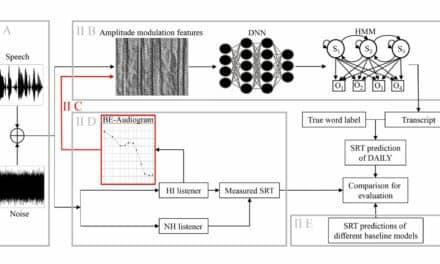
John D. Williams, PhD, associate professor of mechanical engineering, Colorado State University, Fort Collins, Colo, holds the oral retainer device he is developing.
Researchers from Colorado State University (CSU) have developed an oral retainer prototype that delivers sound signals to your tongue, which your brain can learn to interpret as a sort of “braille.” According to a January 16, 2015 Smithsonian magazine article by Erin Blakemore that ran in the online edition, deaf people may soon be hearing through their tongues, thanks to the removable mouth device that is being developed by a team of engineers and neuroscientists at CSU.
According to the report, a goal of the research team was to develop an affordable and removable hearing device for deaf patients as an alternative to a cochlear implant, an expensive hearing device that includes an electrode component which must be implanted in the inner ear via invasive surgery. The prototype for the oral retainer includes an external earpiece that uses Bluetooth to send sounds as electrical impulses to a mouth-worn “smart retainer” that is packed with electrodes.
The prototype for the oral retainer is the result of a study led by John Williams, PhD, an associate professor of mechanical engineering at CSU. Dr Williams was interested in finding ways to bypass the inner ear and identify other sensory substitutes for hearing. Braille is an example of a sensory substitute whereby a blind person uses his fingertips to transmit tactile information to the brain. Dr Williams theorized that the tongue, like the fingertips, is sensitive to tactile stimulation, and might be a good sensory source for delivering sound signals to the brain.
For more about the oral retainer being developed as a hearing device by Dr Williams and colleagues, read the story on the Smithsonian website.
Source: Smithsonian.com, Colorado State University
Photo credits: Colorado State University





